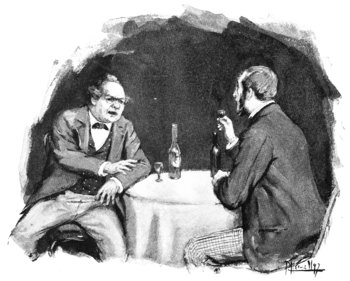Portuguese all over—indolence, piousness, poverty, impotence.
Crews of small boats and tugs all jet black, woolly heads, and very muscular.
Winter.—The South African winter is just beginning now, but nobody but an expert can tell it from summer. However, I am tired of summer; we have had it unbroken for eleven months. We spent the afternoon on shore, Delagoa Bay. A small town—no sights. No carriages. Three rickshaws, but we couldn't get them—apparently private. These Portuguese are a rich brown, like some of the Indians. Some of the blacks have the long horse-heads and very long chins of the negroes of the picture books; but most of them are exactly like the negroes of our Southern States—round faces, flat noses, good-natured, and easy laughers.
Flocks of black women passed along, carrying outrageously heavy bags of freight on their heads—the quiver of their leg as the foot was planted and the strain exhibited by their bodies showed what a tax upon their strength the load was. They were stevedores, and doing full stevedore's work. They were very erect when unladen—from carrying weights on their heads—just like the Indian women. It gives them a proud, fine carriage.
Sometimes one saw a woman carrying on her head a laden and topheavy basket the shape of an inverted pyramid—its top the size of a soup-plate, its base the diameter of a teacup. It required nice balancing—and got it.
No bright colors; yet there were a good many Hindoos.
The Second Class Passenger came over as usual at "lights out" (eleven), and we lounged along the spacious vague solitudes of the deck and smoked the peaceful pipe and talked. He told me an incident in Mr. Barnum's life which was evidently characteristic of that great showman in several ways. This was Barnum's purchase of Shakespeare's birthplace, a quarter of a century ago.

"IT'S A FIRST-RATE IDEA. I'LL BUY THE MONUMENT.
The Second Class Passenger was in Jamrach's employ at the time, and knew Barnum well. He said the thing began in this way. One morning Barnum and Jamrach were in Jamrach's little private snuggery back of the wilderness of caged monkeys and snakes and other commonplaces of Jamrach's stock in trade, refreshing themselves after an arduous stroke of business, Jamrach with something orthodox, Barnum with something heterodox—for Barnum was a teetotaler. The stroke of business was in the elephant line. Jamrach had contracted to deliver to Barnum in New York eighteen elephants for $360,000, in time for the next season's opening. Then it occurred to Mr. Barnum that he needed a "card." He suggested Jumbo. Jamrach said he would have to think of something else—Jumbo couldn't be had; the Zoo wouldn't part
